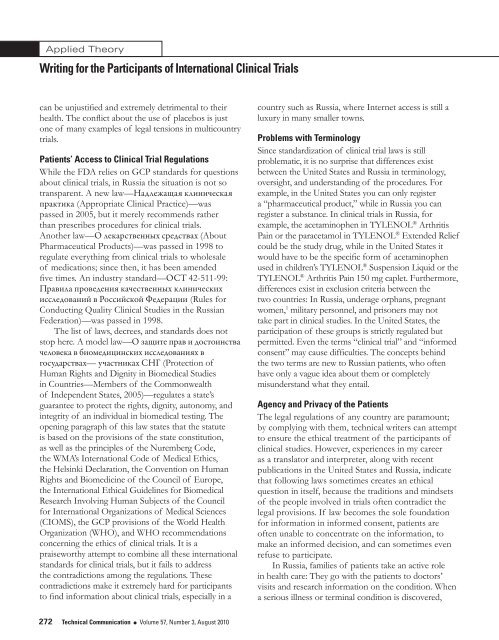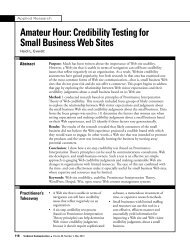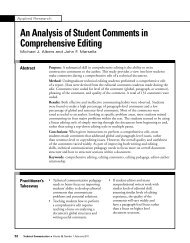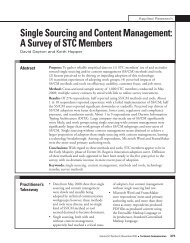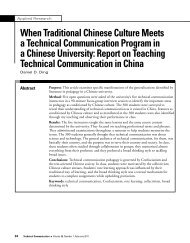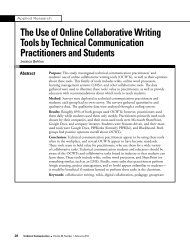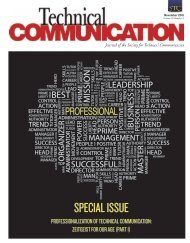Applied TheoryWriting for the Participants of International Clinical Trialscan be unjustified and extremely detrimental to theirhealth. The conflict about the use of placebos is justone of many examples of legal tensions in multicountrytrials.Patients’ Access to Clinical Trial RegulationsWhile the FDA relies on GCP standards for questionsabout clinical trials, in Russia the situation is not sotransparent. A new law—Надлежащая клиническаяпрактика (Appropriate Clinical Practice)—waspassed in 2005, but it merely recommends ratherthan prescribes procedures for clinical trials.Another law—О лекарственных средствах (AboutPharmaceutical Products)—was passed in 1998 toregulate everything from clinical trials to wholesaleof medications; since then, it has been amendedfive times. An industry standard—ОСТ 42-511-99:Правила проведения качественных клиническихисследований в Российской Федерации (Rules forConducting Quality Clinical Studies in the RussianFederation)—was passed in 1998.The list of laws, decrees, and standards does notstop here. A model law—О защите прав и достоинствачеловека в биомедицинских исследованиях вгосударствах— участниках СНГ (Protection ofHuman Rights and Dignity in Biomedical Studiesin Countries—Members of the Commonwealthof Independent States, 2005)—regulates a state’sguarantee to protect the rights, dignity, autonomy, andintegrity of an individual in biomedical testing. Theopening paragraph of this law states that the statuteis based on the provisions of the state constitution,as well as the principles of the Nuremberg Code,the WMA’s International Code of Medical Ethics,the Helsinki Declaration, the Convention on HumanRights and Biomedicine of the Council of Europe,the International Ethical Guidelines for BiomedicalResearch Involving Human Subjects of the Councilfor International Organizations of Medical Sciences(CIOMS), the GCP provisions of the World HealthOrganization (WHO), and WHO recommendationsconcerning the ethics of clinical trials. It is apraiseworthy attempt to combine all these internationalstandards for clinical trials, but it fails to addressthe contradictions among the regulations. Thesecontradictions make it extremely hard for participantsto find information about clinical trials, especially in acountry such as Russia, where Internet access is still aluxury in many smaller towns.Problems with TerminologySince standardization of clinical trial laws is stillproblematic, it is no surprise that differences existbetween the United States and Russia in terminology,oversight, and understanding of the procedures. Forexample, in the United States you can only registera “pharmaceutical product,” while in Russia you canregister a substance. In clinical trials in Russia, forexample, the acetaminophen in TYLENOL ® ArthritisPain or the paracetamol in TYLENOL ® Extended Reliefcould be the study drug, while in the United States itwould have to be the specific form of acetaminophenused in children’s TYLENOL ® Suspension Liquid or theTYLENOL ® Arthritis Pain 150 mg caplet. Furthermore,differences exist in exclusion criteria between thetwo countries: In Russia, underage orphans, pregnantwomen, 1 military personnel, and prisoners may nottake part in clinical studies. In the United States, theparticipation of these groups is strictly regulated butpermitted. Even the terms “clinical trial” and “informedconsent” may cause difficulties. The concepts behindthe two terms are new to Russian patients, who oftenhave only a vague idea about them or completelymisunderstand what they entail.Agency and Privacy of the PatientsThe legal regulations of any country are paramount;by complying with them, technical writers can attemptto ensure the ethical treatment of the participants ofclinical studies. However, experiences in my careeras a translator and interpreter, along with recentpublications in the United States and Russia, indicatethat following laws sometimes creates an ethicalquestion in itself, because the traditions and mindsetsof the people involved in trials often contradict thelegal provisions. If law becomes the sole foundationfor information in informed consent, patients areoften unable to concentrate on the information, tomake an informed decision, and can sometimes evenrefuse to participate.In Russia, families of patients take an active rolein health care: They go with the patients to doctors’visits and research information on the condition. Whena serious illness or terminal condition is discovered,272 Technical Communication l Volume 57, Number 3, August 2010
Applied TheoryTatiana Batovadoctors often consult first with the family to discussthe best way to inform the patient. The doctor andfamily may decide not to inform the patient at all. Theusual rationale in such a decision is that if there is nohope for treatment and recovery, at least the person candie in peace. My family held on to this rationale whenthey decided not to inform my grandmother about theterminal nature of her illness.However, the law in the United States and Russiadictates that fully conscious patients who do notsuffer from a mental illness need to make their owninformed decision about participating in clinical trialsand must independently sign an informed consent form.Informed consent documents often start with studyprotocol titles (e.g., A Randomized, Placebo-Controlled,Phase 1/2 Study of X in Subjects With MetastaticColorectal Cancer) and introductory sentences such as“You are being invited to participate in a research studybecause you have a colorectal tumor.” For a patient, thenews of an illness can come from an informed consentbrochure, even if the family is there to soften it.Law and Life ContextIn countries like Russia, where a large part of thepopulation is at the poverty level, people may overlookthe dangers of a clinical trial if there is no other optionfor treatment (Fiscus, 2009). Russia’s best doctorsare migrating to the clinical trial industry because itis so lucrative; at the same time, many people cannotafford drugs in what is considered a “free” medicalsystem. For many patients, taking part in trials is theonly way to have access to treatment and medications.Lustgarten describes the case of a former metalworker and late-stage cancer patient, Ershov, for whomparticipation in a clinical trial offered the only chanceto “get $800 worth of drugs a month at no cost,reliable access to doctors, and at least the hope of acure” (Lustgarten, 2005, p. 66). The average monthlywage in Russia in 2008 was $694.3 (World Bank, 2009);the average monthly retirement income in 2004 was$66.4 (Ohtsu & Tabata, 2005).If patients are aware of their condition but cannotafford treatment and are advised to take part in a clinicaltrial, how much time are they likely to spend readingthe typical informed consent booklet: 15–20 singlespacedpages replete with medical terms? This problemis common in the United States as well, since a largepercentage of the population does not have sufficienthealth insurance or has no health insurance at all.Doctor-Patient RelationshipEven though in the United States patients may trusttheir doctors, they are encouraged to ask questions.In Russia, patients usually place great trust in theirmedical providers; if the study doctor has a positiveattitude about a clinical trial, the patient is likely toskim through the informed consent or hardly read it atall. In the Ershov case, the study doctor confided that90% of his patients sign the form right away. Ershovhimself said, “They told me the treatment was safe. Itrust my doctor completely” (Lustgarten, 2005, p. 67).According to a recent study published in MoscowPharmacies, because of their blind trust in doctorsand because they do not bother to read the informedconsent documents, patients taking part in clinicalstudies do not know how to store the medication (99%),are not aware of the need to discontinue participation inany other study (86%), do not realize that the study maybe discontinued before the date discussed (63%), and donot know that they should tell their family doctor theyare participating in a study (53%).Benefits for an Individual Versus Benefits for SocietyLooking at Ershov’s interview as described byLustgarten, we need to focus on two words:“treatment” and “cure.” Therapeutic misconceptionis not confined to the United States; it is even morecommon in clinical trials in Russia. Since thesetrials are still a rather new concept in Russia, manyparticipants do not have a clear understanding ofthem. For some, they are the only hope for a cure.For others, they seem like experiments on humanguinea pigs. The latter opinion results from lack ormisinterpretation of information and from mediacoverage of clinical trial “busts” (e.g., testing vaccineson infants in Volgograd—a trial in which parents didnot have clear information).Informed consent documents do not offersufficient help in this situation. The following twosentences illustrate how vaguely the potential social andpersonal benefits are sometimes described in informedconsent documents [emphasis added]: “It is hoped thatthe information learned from this study will increasethe knowledge and understanding of colorectal tumor”Volume 57, Number 3, August 2010 l Technical Communication 273
- Page 1 and 2: AUGUST 2010Volume 57 Number 3SPECIA
- Page 3 and 4: PresidentMichael A. HughesVice Pres
- Page 5 and 6: VoLuME 57, NuMBER 3AUGUST 2010ISSN
- Page 7 and 8: Guest EditorialKirk St.Amant and Ma
- Page 9 and 10: Applied ResearchTechnical Communica
- Page 11 and 12: Applied ResearchNicole St. Germaine
- Page 13 and 14: Applied ResearchNicole St. Germaine
- Page 15 and 16: Applied ResearchNicole St. Germaine
- Page 17 and 18: Applied ResearchNicole St. Germaine
- Page 19 and 20: Applied ResearchNicole St. Germaine
- Page 21 and 22: Applied ResearchNicole St. Germaine
- Page 23 and 24: Applied ResearchNicole St. Germaine
- Page 25 and 26: Applied TheoryTatiana BatovaIntrodu
- Page 27 and 28: Applied TheoryTatiana BatovaMoreno,
- Page 29: Applied TheoryTatiana BatovaThe Uni
- Page 33 and 34: Applied TheoryTatiana BatovaTo addr
- Page 35 and 36: Applied TheoryTatiana Batovathe loc
- Page 37 and 38: Applied TheoryTatiana BatovaJohnson
- Page 39 and 40: Applied TheoryTatiana BatovaInterna
- Page 41 and 42: Applied TheoryMcKee and PorterIntro
- Page 43 and 44: Applied TheoryMcKee and PorterFor e
- Page 45 and 46: Applied TheoryMcKee and Porterpubli
- Page 47 and 48: Applied TheoryMcKee and PorterBecau
- Page 49 and 50: Applied TheoryMcKee and Porterof th
- Page 51 and 52: Applied TheoryMcKee and Porterwith
- Page 53 and 54: Applied TheoryMcKee and PorterA Cop
- Page 55 and 56: Applied TheoryMcKee and PorterConte
- Page 57 and 58: Applied TheoryMcKee and PorterWalto
- Page 59 and 60: Applied ResearchLiza PottsIntroduct
- Page 61 and 62: Applied ResearchLiza Pottsdoes not
- Page 63 and 64: Applied ResearchLiza PottsUser’s
- Page 65 and 66: Applied ResearchLiza Pottsactors, t
- Page 67 and 68: Applied ResearchLiza PottsDRM has a
- Page 69 and 70: Applied ResearchLiza Pottsmake bett
- Page 71 and 72: Applied ResearchLiza PottsOne viewe
- Page 73 and 74: Applied ResearchLiza Pottsinvolved
- Page 75 and 76: Applied ResearchLiza PottsHayhoe, G
- Page 77 and 78: Applied ResearchInternational Fair
- Page 79 and 80: Applied ResearchTyAnna K. Herringto
- Page 81 and 82:
Applied ResearchTyAnna K. Herringto
- Page 83 and 84:
Applied ResearchTyAnna K. Herringto
- Page 85 and 86:
Applied ResearchTyAnna K. Herringto
- Page 87 and 88:
Applied ResearchTyAnna K. Herringto
- Page 89 and 90:
Book ReviewsWriting Successful Scie
- Page 91 and 92:
Book ReviewsThe Process: Business P
- Page 93 and 94:
Book ReviewsHCI Beyond the GUI: Des
- Page 95 and 96:
Book ReviewsOrigins of the Specious
- Page 97 and 98:
Book Reviewsgenre, and process, top
- Page 99 and 100:
Book ReviewsPart One goes from the
- Page 101 and 102:
Book Reviewsrather than writers, an
- Page 103 and 104:
Book ReviewsHow to Write Fast Under
- Page 105 and 106:
Book Reviewsmanagement system (CMS)
- Page 107 and 108:
Book Reviewsnearly strangled when h
- Page 109 and 110:
Book Reviewsinteractive TV model)
- Page 111 and 112:
Book ReviewsOtherwise, Beech shows
- Page 113 and 114:
Book Reviewssuch as blog, I found m
- Page 115 and 116:
Book Reviewsemployees and effective
- Page 117 and 118:
Recent & RelevantSherry Southard, E
- Page 119 and 120:
Recent & RelevantRecent & RelevantC
- Page 121 and 122:
Recent & RelevantRecent & RelevantE
- Page 123 and 124:
Recent & Relevantworking in a langu
- Page 125 and 126:
Recent & RelevantWhat’s the big d
- Page 127 and 128:
Recent & RelevantScientific Writing
- Page 129 and 130:
Recent & Relevantapplicability. Man
- Page 131:
Did You Missthe Summit?Don’t miss


